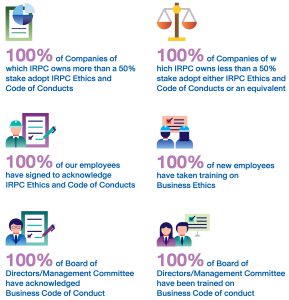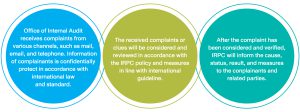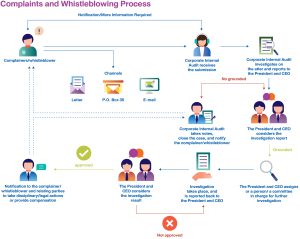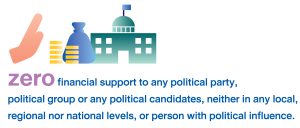Business Ethics and Transparency

Management Approach
1. Policy
To complement the Corporate Governance Policy and Corporate Governance Handbook, IRPC launched additional policies, which are Anti-Corruption Policy and Compliance Policy, outlining a company’s commitment to demonstrate business ethics and integrity in its management practices.
2. Responsible Organization
The Corporate Governance Committee monitors the work of management in compliance with corporate governance principles. Moreover, the Corporate Governance Committee also monitors the efficiency and implementation of the Anti-Corruption Policy and other policies relevant to Good Governance, Risk Management, and Compliance Management (GRC). IRPC has an effective implementation of its code of conduct outlined by the Office of Corporate Affairs with a defined responsible function.
The Audit Committee is responsible for monitoring business operations to ensure its internal control system is functioning properly, as well as operations are in compliance with IRPC’s Corporate Governance handbook and the relevant laws and regulations. In addition, IRPC engages with an independent audit committee to conduct careful and cautious investigation under the scope and authority set by the Boards
3. Management System/Process
Believing that business ethics brings public confidence and trust, IRPC adheres to the code of conduct. Achieving balance of the following business objectives of transparency, auditability, and stakeholders’ stewardship enables sustainability.
Code of Conduct
Our company values, principles and guidelines on business code of conduct are outlined in our Corporate Governance Handbook. IRPC realizes the importance of ethics in business and has ethical business as one of the main considerations in its Corporate Governance Policy with definitions and how to apply in daily working life. The main aspects of business ethics are:
- Responsibility to shareholders
- Relationships with customers and the public
- Relationships with suppliers, business competitors and creditors
- Responsibility to employees
- Responsibility to society and the environment.
IRPC requires that all employees complete an acknowledgement and conformity form, and submit both to the Office of Corporate Affairs. Moreover, IRPC also disseminates information and provides training for its employees on corporate governance and business ethics via new employee orientation, Corporate Governance Day, training course and periodic review via the e-learning system.
In addition our Corporate Governance Handbook principles and guidelines are distributed to business partners, joint ventures, entities in which IRPC holds shares of less than 51%, as well as, other business associates. For joint ventures, IRPC requires joint ventures to maintain their own code of conduct, which should be at least equivalent to IRPC’s Corporate Governance Handbook. In the absence of joint venture’s own code of conduct, IRPC requires our joint venture to adopt IRPC’s Corporate Governance Handbook.

Compliance System [click]
Reporting on Breaches
IRPC has an effective implementation of code of conduct as outlined by the office of corporate affairs with a defined responsible function. There are help desks and channels for complaints and grievances to file complaints for all internal and external stakeholders and the office has, in place, investigation and resolution processes that are clearly defined, unbiased, and transparent. The whistleblowing policy declares a commitment to protect the identity of whistleblowers and witnesses. Both internal and external stakeholders can directly communicate with the chairman of the Audit Committee and Corporate Governance Committee through various channels. The whistleblowing channels are through telephone, company website, email, and PO Box.

Whistleblowing Channels


The cases are assigned to Office of Corporate Internal Audit and relevant business units for verification and the reports are made to the Audit Committee and the Board of Directors as well as the related party in a sequence specified in the Complaint Management Procedure. The Audit Committee is responsible for monitoring business operations to ensure its internal control system is functioning properly, as well as operations are in compliance with IRPC’s Corporate Governance handbook and the relevant laws and regulations. In addition, IRPC engages with an independent audit committee to conduct a careful and cautious investigation under the scope and authority set by the Board to ensure its compliance with the guidance from Stock Exchange of Thailand, code of conduct, and international practices. IRPC provides notification and complaint channels for internal and external whistleblowers to notify information and evidence of illegal and unethical conduct. If the accused is found guilty, they will be subject to the corresponding disciplinary action. All whistleblowers and witnesses will be afforded protection.
Performance
In 2022, IRPC received a total of 11 cases through the whistleblower system, which separated into 2 cases of recommendations and 9 cases of non-compliance with the company’s codes of conduct. These cases are separated into 3 work practice cases, 3 behavior cases, and three with embezzlement with zero cases of fraud or corruption. As a consequence, disciplinary action was taken fairly and transparently against each case in violation of the codes. However, there were 0 complaints found relate to Anti-corruption Policy or fraud and 0 cases found to have caused significant damage. Currently all cases are already closed with appropriate preventive and mitigation measures in place for the responsible functions.
| Amount |
Channel | Type of case | Status | |||||||
| Email & Mail | P.O. Box | Website | supervisor | Work Practice | Behavior | Embezzlement | Suggestion | Completed | Under investigation | |
| 1 | 6 | – | 4 | 3 | 3 | 3 | 2 | 10 | 1 | |
| total | 11 (100%) | 11 (100%) | 11 (100%) | |||||||
| % | 10 | 55 | – | 35 | 27 | 27 | 27 | 19 | 90 | 10 |
IRPC disclosed its details on historical data of past 4 years for whistleblowing cases as,
| Areas | 2019 | 2020 | 2021 | 2022 |
| Substantiated Case | Substantiated Case | Substantiated Case | Substantiated Case | |
| Work Practice | 11 | 15 | 5 | 3 |
| Behavior | 11 | 6 | 20 | 3 |
| Harassment | 0 | 0 | 0 | 0 |
| Discriminated | 0 | 0 | 0 | 0 |
| Anti-competitive business practice | 0 | 0 | 0 | 0 |
| Conflict of Interest | 0 | 0 | 0 | 0 |
| Money laundering | 0 | 0 | 0 | 0 |
| Fraud* | 0 | 0 | 0 | 0 |
| Embezzlement | 0 | 0 | 1 | 3 |
Remark : Corruption & Bribery cases are included in Fraud category and all cases during 2019 and 2022 were completely investigated, judged and solved.
Consequence of Breaches
As a consequence, disciplinary action was taken fairly and transparently against each case found to be in violation of IRPC’s code of conduct. The cases were assigned to the Internal Audit Committee and relevant business units for verification and the reports were made to the Audit Committee and the Board as well as the related party in a sequence specified in Complaint Management Procedure.
In 2022, following the verification, there were 6 cases of verbal warnings, 3 cases of official written warnings and 0 case of contract terminations. The responsible functions have been notified to provide preventive measures, for example, to raise the awareness on corporate culture and desired behavior, to build good relationship in each functions through activities, to conduct “feed back” session for employees and their subordinate to make open minded conversation, and to conduct the Corporate Governance, Business Ethics and Compliance awareness raising training program, periodically.
4. Transparency
Organization Contributions
Risk of changes in the regulatory regime often has significant implications for IRPC’s current operations and future direction. Accordingly, IRPC considers engaging and collaborating with regulators to advance the principles of sustainable development, protect our rights, and strengthen our position as a leading integrated petrochemical complex in Asia. As prescribed by Sustainability Management Sub-Element 6.3, regulatory advocacy independence and transparency shall be exercised at all times and in all communications and other interactions with regulators and policy makers.
In addition, IRPC contributes to national and international associations and organizations in order to advocate for public policies and regulations that enhance sustainability practices, and assist policymakers through experience and information sharing of either internal or external trends regarding sustainability. However, IRPC established an Anti-corruption Policy to clarify its position as politically neutral, which means it does not directly or indirectly support any political parties or politicians, but fully supports compliance with the law and democratic rule. Even though the Board, executives, and employees have legal rights and political freedom, harming IRPC’s reputation and businesses is strictly prohibited. For more information, please visit Corporate Governance Handbook, Section 3 Anti-corruption Policy, page 20-21.
Historical data for the past 4 years of IRPC’s monetary contribution to organizations that relate to trade associations or tax-exempt groups shown in the table below, the scope of contribution covers 100% of total revenues.
| Type of Organization | Name of Organization | Amount Paid (THB) | Total Amount (THB) | |||
| 2019 | 2020 | 2021 | 2022 | |||
| Lobbying, interest representation or similar | – | 0 | 0 | 0 | 0 | 0 |
| Local, regional, or national political campaigns / organizations / candidates | – | 0 | 0 | 0 | 0 | 0 |
| Trade Association | Oil Industry Environmental Safety Group Association | 1,284,000 | 4,766,000 | 4,302,000 | 4,654,234 | 15,006,234 |
| Thai Institute of Directors (IOD) | 500,000 | 500,000 | 500,000 | 500,000 | 2,000,000 | |
| Responsible Care Management Committee of Thailand, Chemical Industry Club of the Federation of Thai Industries (RCMCT) | 241,820 | 336,000 | 308,600 | 312,670 | 1,199,090 | |
| Thailand Business Council for Sustainable Development | 250,000 | 250,000 | 250,000 | 250,000 | 1,000,000 | |
| Anti-Corruption Foundation | 2,000,000 | 1,000,000 | 1,000,000 | 1,000,000 | 5,000,000 | |
| Tax-exempt Group | Foundation for the Global Compact | 458,715 | 470,312 | 480,435 | 528,750 | 1,938,212 |
| Petroleum Instituted of Thailand | 440,000 | 470,800 | 440,000 | 440,000 | 1,790,800 | |
| Total Contributions | 5,174,535 | 7,793,112 | 7,281,035 | 7,685,654 | 26,434,336 | |
Largest Contributions and Expenditures
To demonstrate our transparency in political contributions, IRPC discloses information about contributions that create or influence public policy on our corporate website. Two key issues that IRPC consistently supports are below:
| Key Issue | Corporate Position | Description of Position/Engagement | Total Spending in FY 2022 (THB) |
| Responsible business operation for long-term business success and support a development of sustainable petroleum and petrochemical industries |
Support |
IRPC values the importance of sustainable practice in business operations as it is a key driver of our business to achieve our company’s vision. Also, to support commitment to improve performance in corporate governance, health, safety and in protecting the environment. IRPC continuously contributes and supports guidance for setting regulations in petroleum and petrochemical industries, in which those regulations will generate benefits to all industries. The purpose of this contribution is to operate our business in accordance with the regulations, comparable to international practices alongside with global sustainable megatrend. |
6,906,904 |
| Driving sustainability toward net zero carbon business | Support | In order to drive country and company itself to achieve net zero commitment, IRPC has join the council providing a robust tools and knowledge to take full responsibility for their climate impact and make verified positive contributions to society and the environment. Also, to advocate the climate related regulations. Thus, IRPC is a pioneer supporter of organizations that advocate sustainable practices such as a founding member of the Global Compact Foundation in Thailand and also being executive committee to Thailand Business Council for Sustainable Development. All forms of contribution are paid through membership fees which are made transparent to stakeholders. | 690,000 |
Top Five organization
In 2022’s fiscal year, IRPC has contributed to the following organizations that relate to trade associations or tax-exempt groups:
1. Oil Industry Environmental Safety Group Association
– to participate and support related authorities in adopting new regulations, participate in education and training to promote safety and the best environmental practices amongst members, and collaborating with the government and organizations on oil spill response activities.
2. Anti-Corruption Foundation
Anti-Corruption Foundation has cooperated with organization members and networks in Thailand. The foundation emphasizes planting moral, ethical values and anti-corruption culture to Thai citizens, especially in young people and communities. Additionally, the foundation has a significant role to drive national strategy regarding preventing corruption event and promoting anti-corruption culture in Thailand together with government sector and private sector.
3. Foundation for the Global Compact
– to establish UNGC Local Network Thailand, IRPC as one of founding member, aiming to support the Principles of the UN Global Compact on human rights, labor, environment and anti-corruption and report the progress to UNGC in order to align with United Nation’s Sustainable Development Goals. Moreover, to conduct knowledge sharing regarding human rights, corporate governance, and anti-corruption aspects.
4. Thai Institute of Directors
– the Thai IOD has been at the forefront of promoting good governance practices in the Thai companies. Through its various activities, the Thai IOD had helped develop professional standard of directorship, and provided best practice guidelines for company director to perform their duties effectively up to the international standards. It is the Thai IOD belief that with effective directors, the company will be guided in the way that it can be managed and operated effectively, hence, resulting in shareholders value and sustainable growth of the Thai economy.
5. Petroleum Instituted of Thailand
– to have dialogue with PTIT and peers in petroleum and petrochemical industries for the promotion of sound and practical policies and regulations.

IRPC remains politically neutral and contribute zero financial support to any political party, political group or any political candidates, neither in any local, regional nor national levels, or person with political influence. In addition, IRPC is well aware that contributions and charitable donations may impact the company’s reputation through bribery or corruption cases. Hence, the company strictly follows our Anti–corruption Policy and never makes any contributions or charitable donations related to bribery or corruption.



 Live Stream
Live Stream